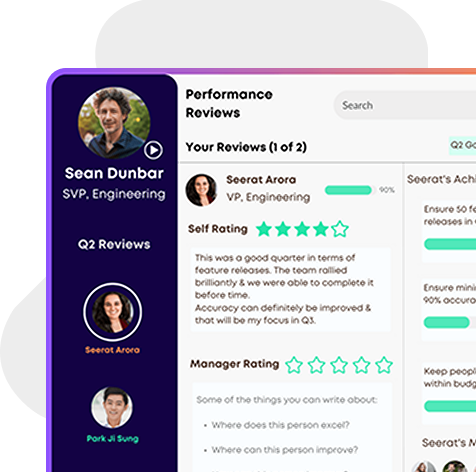

Why Is Performance Management Important? The Overlooked Truth

Overview
You're Asking the Wrong Question
Why is performance management critical these days? So, here's an interesting read for you.
Yes, most companies have customized performance management systems for driving productivity and tracking employee performance. Such systems aim to align organizational performance with a team's performance.
An effective performance management system goes beyond evaluating performance. It is more about aligning individuals with organizational goals and objectives, fostering growth, and building a positive working culture.
Transition happens when you stop working for output and focus more on clarity, growth, and adaptability. Instead of focusing on what matters, focus on the goals, tasks, and projects responsible for driving the organizational goals.
This blog will explore what is performance management and why it is important.
Performance Management Is the Operating System for Organizational Clarity
After reading about why performance management is important in the earlier section, let us now focus on why is performance management important to organizations.
Performance management is an operating system that offers clarity. It gives you a framework for setting your expectations, providing regular client feedback, and aligning the company's efforts with the organization's goals and objectives. These factors foster a clear understanding of your goals and responsibilities.
- Performance management, when done right, builds organizational clarity:
- What does success look like?
- How is it measured?
- What's my role in the bigger picture?
Performance management is a translator between your business strategy and your daily execution list. Yes, performance management functions as an important translator, ensuring that your organization's strategic goals are effectively communicated and translated into actionable tasks.
It's the Only Scalable Way to Build Trust
The statement, 'It's the only scalable way to build trust,' is more about consistency and transparency. Such qualities are crucial for maintaining trust at all levels. Consistently delivering projects on commitments ensures that trust is built for reliability. These performance management sessions help individuals understand what the organization expects out of them so that they can trust their actions and make informed decisions.
With clarity on expectations, regular feedback, and goals become more meaningful. All these collectively boost psychological safety. Sharing information and feedback openly and candidly supports trust and understanding amongst your employees. Performance management systems are systemic approaches to sharing feedback, goals, objectives, and growth principles. In the absence of a structured system, the input becomes biased. The performance becomes more political, and there is uncertainty regarding the developmental aspect.
Performance Management Isn't About Reviews, It's About Readiness
Let us now try to understand why it is important to have a performance management system to be ready for tomorrow.
The market is quite volatile, and strategy keeps shifting and transitioning rapidly. Performance management is about analyzing these market shifts and aligning organizational, team, and individual goals and objectives. These are essential in collectively driving organizational success. It is more about identifying skills gaps and providing opportunities for your employees to develop the right skillsets.
- The question isn't "How did you perform last year?" It's:
- Are we building skills for what's next?
- Are our teams resilient to change?
- Are we ready for a re-org, product pivot, or market slowdown?
Performance management conversations help track the adaptability of your employees who go beyond their roles and responsibilities. Such reviews offer a platform for the organization to receive open feedback, plan for organizational development, and identify developmental areas.
It's the Most Underrated Way to Scale Leadership
Understanding why managing employee performance is important involves understanding why organizational leadership is critical. Here is the correlation between the two concepts:
One of the most underrated ways of scaling organizational leadership is prioritizing and cultivating cultural awareness and emotional intelligence. This fosters a sense of self-disclosure amongst organizational leaders, enabling an authentic and more impactful leadership approach.
Mostly, you'll observe individual contributors (ICs) being promoted to managerial positions.
Effective performance management requires a distinct skillset beyond the essential ones under their roles and responsibilities. Here is where the organizational role comes into play, in training to equip your managers with such skills.
- A sound performance management system teaches managers:
- How to give feedback
- How to coach, not just direct
- How to hold people accountable without micromanaging
Equipping your organizational managers with a 'playbook' or a structural guide has always been a crucial aspect of an effective performance management system. Without its presence, your organizational managers are left to navigate their role complexities. This is why is performance management important in HR.
{{cta-1}}
It Aligns Growth With Purpose, Not Just KPIs
Aligning individual and team growth with the right purpose rather than simply focusing on KPIs is essential. It ensures that every individual effort contributes to the common goal of the organization. It fosters a sense of real meaning and direction towards organizational goals and objectives beyond achieving the organizational targets. Your most self-motivated employees will never chase the bonuses but feel they are significantly working on their growth.
- Performance management links:
- Personal growth with team success
- Career goals with company OKRs
- When done well, performance systems help answer the following:
- "How am I progressing?"
- "Where do I go next?"
- "What does success look like beyond this quarter?"
This is why goal setting is important in the performance management system.
It Helps Leaders Spot the Gap Between Activity and Impact
A leadership' gap analysis' helps identify and address the discrepancies between what your organization is doing and its impact on its broader vision. It is an approach to comparing the organization's current performance with its desired performance. This assessment is even supportive in revealing areas for improvement and strategic action.
- Activity ≠ Performance
- A sound system helps you differentiate:
- Who's getting results vs. who's staying busy
- Who's operating with clarity vs. who's improvising under stress
- This is especially critical in hybrid and remote teams, where visibility is low and misalignment is high
- Performance management is a lens to spot early energy leaks, false urgency, or early burnout cycles.
It Future-Proofs Talent Planning
'It Future-Proofs Talent Planning has been a proactive strategy for ensuring that the organization, teams, and individuals possess the proper skill set and talent to succeed in goals and objectives.
So, the answer to the question of why employee participation in the performance management process is important, is:
- It helps in anticipating the organizational needs
- It contributes to developing the employees
- It helps in strategically acquiring the talent
Succession planning isn't a one-time exercise—it's baked into good performance management. It ensures a smooth transition between several key roles within your organization to foster a continuous development culture. With a proactive identification and development of potential successors, your organization can minimize the role and functional disruption. Identifying and setting clear career paths and opportunities for individual and organizational growth is essential. This process ensures that your future organizational leaders have the required competencies.
- Regular check-ins and growth conversations help identify:
- Hidden leaders
- Burnout risks
- Skill gaps
Over time, the performance management system helps build an internal talent standard for the lateral growth of organizational leaders' roles and responsibilities. This is why employee participation in the performance management process is essential.
Common Misconceptions About Performance Management (And What To Do Instead)
Common misconceptions regarding performance management include viewing it as an event focused primarily on weaknesses and evaluations. Performance management is not just about discussing a culture of continuous improvement and development. It is a necessity to shift towards a supportive and growth-oriented culture.
What Happens Without a Performance Management System
Without a performance management system in place within your organization, it is likely to deal with issues related to:
- Unclear expectations.
- Lack of role or project accountability.
- Obstructed growth.
- Lower morale and engagement of employees.
Here are some commonly witnessed scenarios in the absence of an effective performance management process:
- Employees start asking: “Does any of this matter?”.
- Managers make decisions based on gut, not clarity.
- Promotions and raises become political, not performance-based.
- Attrition becomes unpredictable, and high performers leave silently.
Strategy execution falters as goals are misaligned and feedback is inconsistent.
{{cta-2}}
A Modern Performance Management Framework (Optional Section)
A modern performance management framework looks after continuous feedback and regular check-ins for each employee. These performance management systems are goal-oriented as opposed to the traditional annual reviews. These focus more on how your employees engage, develop, and align with the objectives and goals of your organization.
- What the best companies are doing:
- Real-time feedback loops, not once-a-year reviews
- Goal-setting rhythms built into team meetings
- Performance is a dialogue, not a rating
Companies such as Klaar have come up with effective and structured performance management systems for all companies at the micro and macro levels. These tools empower your organizational HR and managers to focus more on individual goals and development, continuous feedback, and goal alignment. Modern frameworks are beneficial in empowering your employees by allowing them to be more autonomous and exercise control over their tasks and activities.
Align Purpose with Progress—Effortlessly
Want to align growth, purpose, and outcomes without overwhelming managers? Klaar helps teams track progress, give feedback, and connect performance to goals.

Build a Culture Beyond Ratings
Your performance system should be more than ratings. With Klaar, create a culture of clarity, accountability, and growth—one conversation at a time.

Wrapping Up
The real reason for the organizations to invest time and effort in performance management is to make people feel seen, supported, and serious about their individual and organizational growth. In this world of market uncertainties, effective performance management systems such as those from Klaar are your organization’s clarity engines. These are not just your systems, but rather create a culture you build for your organization. Klaar tools are the answers to why is performance management important in organizations for succeeding in the present market dynamics.
.svg)
.svg)




.svg)

.svg)